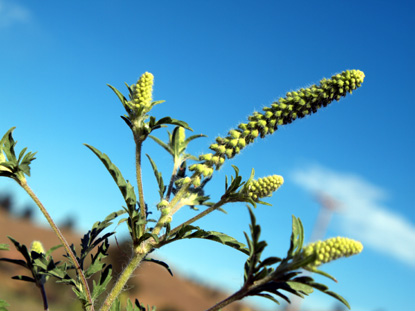 These are five ways to limit your exposures to ragweed.
These are five ways to limit your exposures to ragweed.1. Keep the Windows and Doors Closed
Close the doors and windows in the house, and drive with windows up during a travel until the end of ragweed season at the beginning of November, depending on your location. Adjust air conditioning so you don't have to open the windows and let tagweed pollen in.
2. Remove Ragweed From Your Home
Ask other people to cut down the ragweed around your home so that you're not quickly hit by the ragweed pollen when you venture beyond the house door.
3. Avoid places Where Ragweed Grows
The edge of forest, alongside roads, unoccupied lots, even the lawn are good locations for ragweed. So don't walk where ragweed usually increases. That being said, autumn is a colorful seasons, and it would be pity not to walk and relish the colors, get a HEPA (high efficiency particle arresting) mask Every time you go to locations recognized to have plenty of ragweed. The masks can be purchased from the nearest hardware stores. You can look a bit peculiar, but you will feel good after a good walk.
4. Wash Away Pollen From Everything
After going outdoors, you have to be sure to wash your skin and clother you are wearing quickly and take a good shower to clean up pollen from the skin and hair to prevent it causing allergy.
5. Get an Air Filter
Since it's difficult to stave off ragweed entirely, a few pollen can get in when you open the windows, or will bind to your clothes as you go outdoor. Using a HEPA (high efficiency particle arresting) air purifier can mean that ragweed pollen that somehow can get inside the house will be continuously filtrated of the indoor air before causing cough, sneeze or runny nose. Designed to be effective around the clock, the air purifier should eradicate the causes of the problem instead of waiting to deal with the symptoms.

 Ragweed allergies are caused by ragweed pollen in the air that you breathe. Ragweed pollen present many problems including sneezing, coughing watery eyes and watery eyes and in many people affected can feel very miserable. These symptoms are a lot like a typical cold and are difficult to separate.
Ragweed allergies are caused by ragweed pollen in the air that you breathe. Ragweed pollen present many problems including sneezing, coughing watery eyes and watery eyes and in many people affected can feel very miserable. These symptoms are a lot like a typical cold and are difficult to separate.